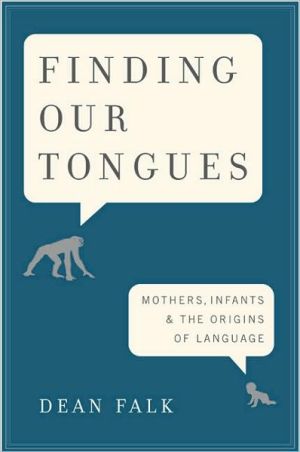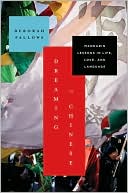Finding Our Tongues: Mothers, Infants, and the Origins of Language
Scientists have long theorized that abstract, symbolic thinking evolved to help humans negotiate such classically male activities as hunting, tool making, and warfare, and eventually developed into spoken language. In Finding Our Tongues, Dean Falk overturns this established idea, offering a daring new theory that springs from a simple observation: parents all over the world, in all cultures, talk to infants by using baby talk or “Motherese.” Falk shows how Motherese developed as a way of...
Search in google:
A controversial new theory that the origins of spoken language, music, and art lie in the early communication between mothers and infants Publishers Weekly The origins of language, says anthropologist Falk (Braindance ), lie deep in the past, long before Homo sapiens appeared on earth, when some baby hominids lost the common primate ability to cling to mothers with both hands and feet. Mother would have to put baby down to be able to forage for food. This behavior, suggests Falk, led to the creation of calls so that a mother and her baby could know that the other was nearby. Falk claims these calls led not only to language but also to the creation of music, through the inflections of the mother-baby calls, and to pictorial art, as babies drew in the dirt. Despite Falk's evidence, readers may find it a stretch that language, music and art all developed from "putting the baby down" (with dad nowhere in the picture). The author seems weak on basic principles of linguistics, for which she has to quote "an anthropologist friend," and music, where her understanding of interval patterns is at a very basic level. Nonetheless, readers interested in language acquisition may find Falk's hypothesis thought provoking. (Mar.) Copyright © Reed Business Information, a division of Reed Elsevier Inc. All rights reserved.
Ch. 1 Silence Is Golden 1Ch. 2 Saying While Soothing 19Ch. 3 And Down Will Come Baby 39Ch. 4 How Our Ancestors Found Their Voice 57Ch. 5 The Seeds of Language 71Ch. 6 What's in a Name? 97Ch. 7 She Shall Have Music 117Ch. 8 Ancient Gestures, Modern Art 137Ch. 9 Finding Our Tongues 161Acknowledgments 179Notes 181Bibliography 215Index 231
\ Publishers WeeklyThe origins of language, says anthropologist Falk (Braindance ), lie deep in the past, long before Homo sapiens appeared on earth, when some baby hominids lost the common primate ability to cling to mothers with both hands and feet. Mother would have to put baby down to be able to forage for food. This behavior, suggests Falk, led to the creation of calls so that a mother and her baby could know that the other was nearby. Falk claims these calls led not only to language but also to the creation of music, through the inflections of the mother-baby calls, and to pictorial art, as babies drew in the dirt. Despite Falk's evidence, readers may find it a stretch that language, music and art all developed from "putting the baby down" (with dad nowhere in the picture). The author seems weak on basic principles of linguistics, for which she has to quote "an anthropologist friend," and music, where her understanding of interval patterns is at a very basic level. Nonetheless, readers interested in language acquisition may find Falk's hypothesis thought provoking. (Mar.)\ Copyright © Reed Business Information, a division of Reed Elsevier Inc. All rights reserved.\ \








